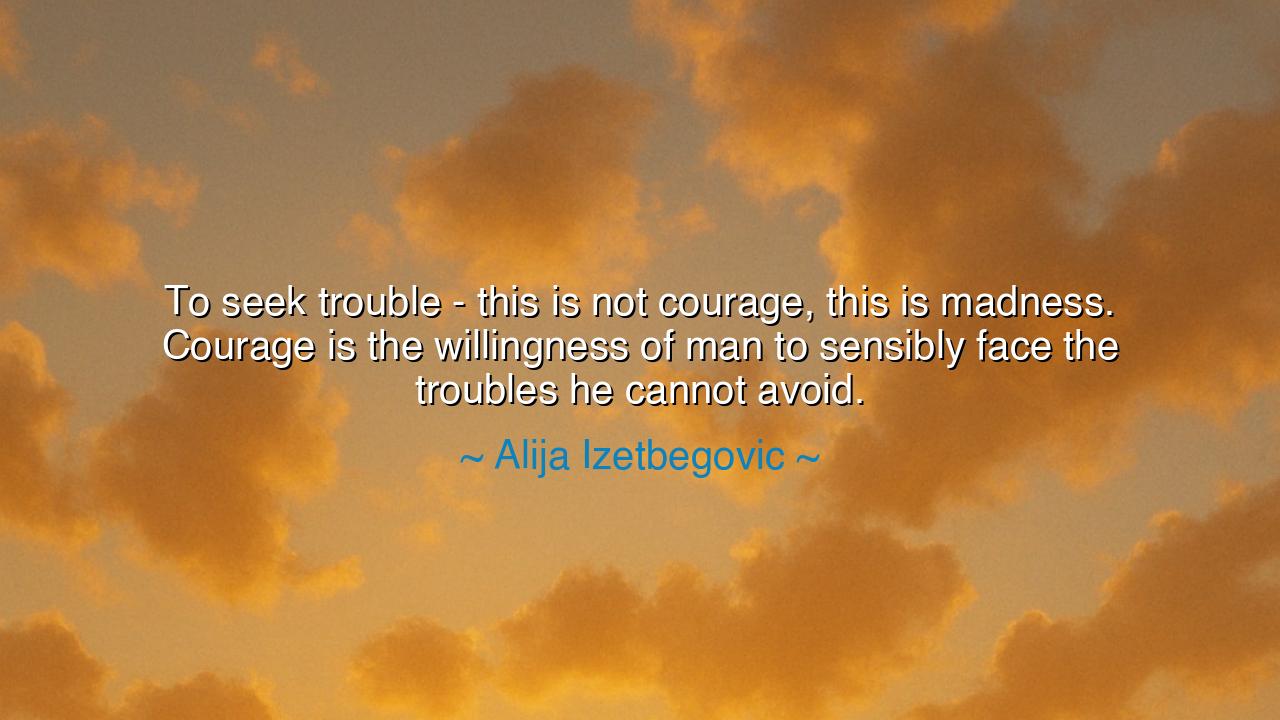
To seek trouble - this is not courage, this is madness. Courage
To seek trouble - this is not courage, this is madness. Courage is the willingness of man to sensibly face the troubles he cannot avoid.






The statesman and philosopher Alija Izetbegović, who led his people through the storm of war and the burden of rebuilding, once said: “To seek trouble — this is not courage, this is madness. Courage is the willingness of man to sensibly face the troubles he cannot avoid.” These words, forged in the fire of conflict, carry the quiet authority of one who has seen both the nobility and the folly of humankind. In them lies a timeless truth — that courage is not recklessness, but wisdom in the face of hardship; it is not the pursuit of danger, but the refusal to surrender to it. True bravery does not seek suffering for its own sake — it meets suffering with dignity when fate demands it.
Alija Izetbegović, the first president of independent Bosnia and Herzegovina, was not a man of boastful strength, but of moral conviction. He lived through imprisonment, persecution, and war, yet his spirit remained calm and steadfast. His words emerged from the crucible of the Bosnian War, when courage was both a necessity and a curse. He saw that too many confuse courage with aggression — that some believe to be fearless means to provoke conflict, to seek glory through chaos. But he had learned, through pain and prayer, that true courage is not loud or impulsive; it is quiet, deliberate, and rooted in reason. It is the choice to stand one’s ground when one would rather flee, and to act rightly when fear or anger would lead astray.
The ancients, too, understood this distinction. Aristotle, in his Nicomachean Ethics, wrote that courage is the mean between cowardice and recklessness. The coward flees from all pain, while the reckless man rushes into it blindly. The courageous man stands firm where he must, guided by wisdom and purpose. So too does Izetbegović echo this teaching — that courage is born of duty, not desire. To seek trouble for the sake of pride or excitement is to invite ruin upon oneself and others. But to face unavoidable suffering — the suffering that life places before every soul — with patience, faith, and clarity, is the mark of true valor.
Consider the life of Nelson Mandela, who spent twenty-seven years in prison for his struggle against apartheid. He did not seek imprisonment, nor did he glorify suffering. But when injustice confronted him, he did not flee. He faced his fate with resolve and grace, turning hardship into a school of wisdom. His courage was not the madness of defiance for its own sake, but the calm endurance of a man who recognized that there are battles one cannot avoid — battles that must be fought not with rage, but with dignity. Like Izetbegović, Mandela showed that courage is not the absence of fear, but the mastery of it in the service of what is right.
There is a kind of madness in the human heart that confuses violence with strength. Many men, seeking to prove themselves, invite danger needlessly — they fight for pride, not principle. Izetbegović calls this what it is: folly. The one who seeks trouble is not brave, but lost; he mistakes the noise of conflict for the voice of purpose. Courage, by contrast, is measured and moral. It knows when to stand and when to yield. It acts not from impulse, but from conscience. It is not afraid to fight — but it fights only when fighting becomes the last refuge of honor.
Wisdom and courage, then, are inseparable. To be courageous without wisdom is to destroy; to be wise without courage is to decay. The balance of these two virtues is the foundation of leadership, and of life itself. Izetbegović, who carried his nation through darkness, knew that the bravest act is often not to strike, but to endure — to bear the weight of responsibility with a steady hand and an unbroken spirit. He knew that the man who meets hardship with calm faith is stronger than the one who hurls himself recklessly into peril. For madness burns quickly, but courage endures.
So, my child, learn from this ancient wisdom wrapped in modern words: do not chase trouble, but do not flee from it when it comes. When life tests you, meet it not with panic, but with purpose. Let your courage be guided by reason, your strength by compassion, your conviction by humility. When storms arise that you cannot escape, stand firm — but stand with wisdom, not with rage. For courage that is senseless destroys, but courage that is sensible redeems. And when you face the troubles that life has written into your destiny, remember the teaching of Alija Izetbegović: that true courage lies not in seeking war, but in bringing peace through endurance, faith, and clarity of heart.






AAdministratorAdministrator
Welcome, honored guests. Please leave a comment, we will respond soon